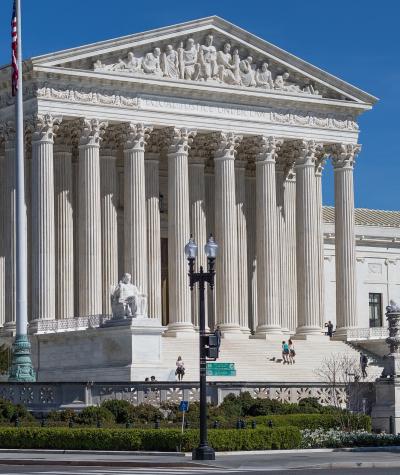One year ago, Justice Kennedy wrote in Citizens United, on behalf of eight of the Court's nine Justices: "A campaign finance system that pairs corporate independent expenditures with effective disclosure has not existed before today." Nor, sadly, did it exist after that day.
Justice Kennedy offered these words as solace to those who feared the consequences of the Court's decision to unleash of millions of corporate dollars into our political process. He continued: "The First Amendment protects political speech; and disclosure permits citizens and shareholders to react to the speech of corporate entities in a proper way. This transparency enables the electorate to make informed decisions and give proper weight to different speakers and messages."
Justice Kennedy claimed to be striking a balance. Corporations get unrestrained political speech, while the electorate gets effective disclosure of who is behind that speech.
Unfortunately, the electorate got the short end of the stick. Corporations spent unknown millions in 2010 elections, but the "campaign finance system that pairs corporate independent expenditures with effective disclosure" simply does not exist.
Though Congress, through the enactment of the Bipartisan Campaign Reform Act of 2002 (BCRA), dramatically improved campaign finance disclosure, the Federal Election Commission (FEC) has since eviscerated the law.
Included in BCRA was the requirement that any "person" (a term that includes corporations and other organizations) that makes a disbursement for an "electioneering communication" must disclose the names and addresses of all contributors who contributed $1,000 or more to the person making the disbursement. The term "electioneering communication" means a broadcast, cable or satellite communication referring to a federal candidate, made within 30 days of a primary or 60 days of a general election and targeted to the candidate's electorate.
In the wake of Citizens United, the electorate witnessed a flood of such TV and radio ads during our 2010 federal elections - with tens of millions of dollars of such political ads paid for by the U.S. Chamber of Commerce and other political organizations with innocuous sounding names like American Action Network. But did we receive the disclosure of every person who contributed $1,000 or more to these organizations - as Congress required and Justice Kennedy and his colleagues presumably envisioned? No.
Why didn't the electorate receive disclosure of who paid for these political ads?
In a rulemaking proceeding in 2007, the FEC took step one in eviscerating BCRA's disclosure requirements. Despite the fact that Congress had passed a law requiring disclosure of anyone who contributed $1,000 or more to a person paying for "electioneering communication," the FEC, over the objection of the bill's authors, the Campaign Legal Center and others, decided that it would only require donor disclosure if the donor "specifically designated" their contribution for electioneering communications.
Step two of the FEC's evisceration of BCRA's disclosure requirements occurred in August 2010 with even less public notice and fanfare, when the FEC's three Republican members, Vice Chair Hunter, together with Commissioners McGahn and Peterson, published their "Statement of Reasons" explaining why the three Commissioners blocked the FEC's investigation of Freedom's Watch, Inc., for its failure to disclose the identity of a donor alleged to be the organizations' primary financier and, further, alleged to parcel out his money project by project. Among the Commissioners' reasons for blocking the investigation was their explanation that the FEC's rules only require donor disclosure when the donation is made "for the purpose of furthering the electioneering communication that is the subject of the [disclosure] report." In other words, unless a donor specifically designates their contribution for the airing of a particular ad, no donor disclosure is required by law. Given that political ads are typically created after the money is raised to pay for them, this effectively means there is no required donor disclosure.
To re-cap:
- In 2002, Congress required any group that pays for electioneering communication to disclose the identity of anyone who contributed $1,000 or more to the group.
- In 2007, the FEC decided it would only require donor disclosure if the donor specifically designated their contribution for electioneering communications, generally.
- In 2010, three members of the six-member Commission made clear that they view federal law as only requiring donor disclosure if the donor specifically designates their contribution for the airing of a specific electioneering communication.
Without the necessary four votes to pursue enforcement actions against groups that refuse to disclose their donors, the 2010 general election became a wild west of undisclosed political spending.
It gets worse. Yesterday at a public meeting the Commission's three Republicans added insult to injury when they refused to approve a long-overdue Notice of Proposed Rulemaking (NPRM) to launch a rulemaking proceeding in response to the Citizens United decision that would revisit the Commission's disclosure rules. An NPRM is merely the first step in the rulemaking process, proposing issues the Commission might address in the rulemaking and seeking public comment. The three Republican Commissioners claimed that opening the issue to public comment would unfairly burden the public.
I felt like Alice in Wonderland sitting at the meeting, listening to three Commissioners who frequently wrap themselves in the First Amendment to justify deregulation of money in politics, now denying the public its First Amendment right to weigh in on this critical issue-all the while pretending to be doing us all a favor. With friends like that, who needs enemies?
So here we are, one year after Citizens United, on the brink of what will almost certainly be the highest-spending Presidential election in our nation's history. Much of that spending will be impossible to trace, so good luck figuring out who or what corporation or union is trying to buy your vote. And whatever you do, don't count on the Supreme Court or the FEC for any assistance.
This post was originally part of an ACSblog symposium marking the one-year anniversary of the landmark decision Citizens United v. FEC on January 21, 2011.
